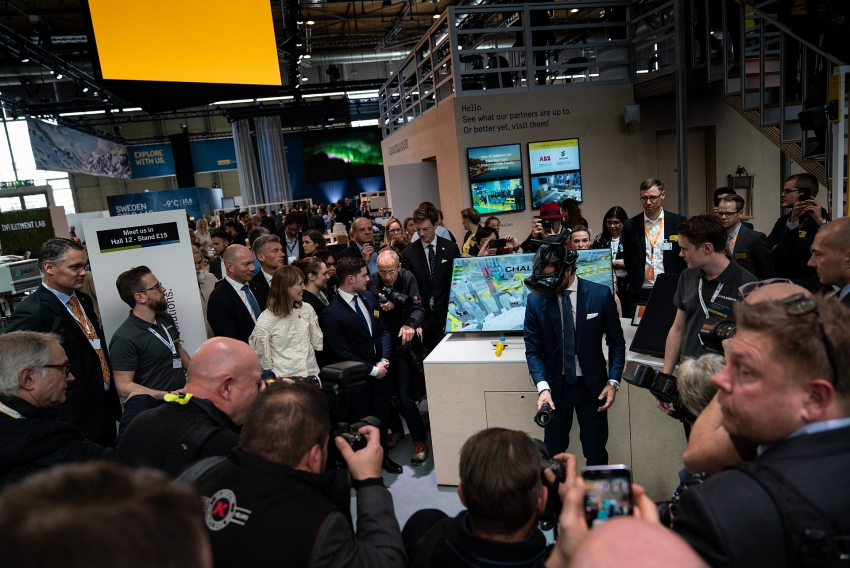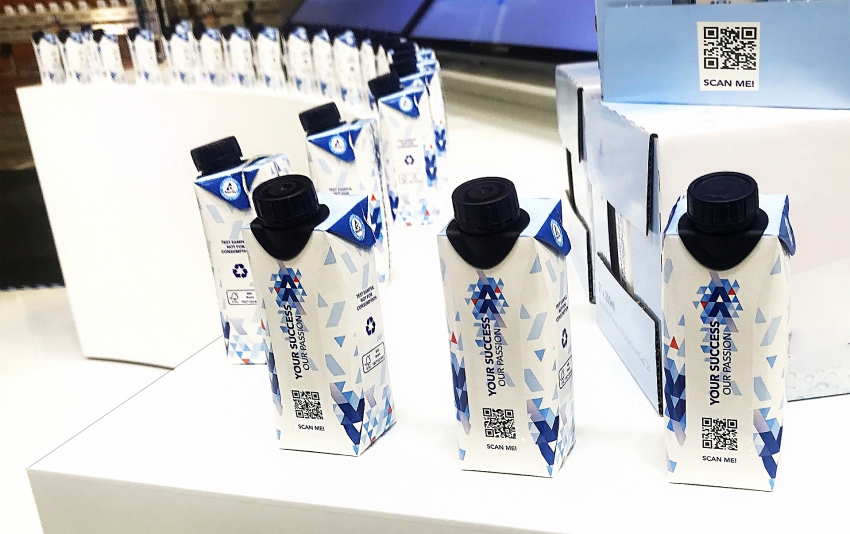Tetra Pak solutions transform F&B sector in 4.0 era
 |
| Tetra Pak introduces the flagship “factory of the future” solution that leverages AI platform to support human at the Hannover Messe 2019 in Germany |
Industry 4.0 is now present in every sector of production and the food and beverage (F&B) sector is no exception as a range of disruptive technologies are set to bring it an all-around face-lift.
These solutions will pave the way for smarter factories while reducing their environmental impact and allowing product packaging to become an interactive information channel for producers, retailers, and shoppers alike.
Factory of the future
“We are in a period where the market is changing at a dizzying speed. Transforming consumer demand coupled with regulations require a new way of food manufacturing that is much more efficient and guarantees food safety,” said Johan Nilsson, vice president of Industry 4.0 and Digitalisation at Tetra Pak.
Tetra Pak has developed the “factory of the future” solution which promises to revolutionise the way food manufacturing plants operate.
Machines will be able to communicate with each other as well as with the digital systems of the entire operation, automatically taking on tasks such as diagnosing problems, ordering and delivering parts, and looking for the most suitable engineer for the tasks needed.
Supported by these smart solutions, the workforce will be able to focus on managing the plant, making quick, informed decisions and continuously increasing the speed of production, reducing errors, and minimising product waste.
 |
| Tetra Pak’s connected packaging platform helps transform milk and juice cartons into digital tools |
Connected packaging platform
One of the trends behind Industry 4.0 is digitalisation. Leveraging the digital technology’s robust development,Tetra Pak has launched its connected packaging platform, helping to transform milk and juice cartons into interactive information channels, full-scale data carriers, and digital tools.
Driven by the trends behind Industry 4.0 and placing code generation, digital printing, and data management at its core, the connected packaging platform will bring new benefits to food producers, retailers, and shoppers.
| The connected packaging platform aims to bring enormous benefits to food producers, retailers, and shoppers alike. |
For producers, the new packaging platform will offer end-to-end traceability to improve the production of the product, quality control, and supply chain transparency. It will have the ability to track and trace the history or location of any product, making it possible to monitor for market performance and any potential issues.
For retailers, it will offer greater supply chain visibility and real-time insights, enabling distributors to track stock movements, be alerted when issues occur, and monitor delivery performance.
For shoppers, it will mean the ability to access vast amounts of information such as where the product was made, the farm that the ingredients came from, and where the package can be recycled.
Tetra Pak has successfully completed pilots with its customers to test the new connected package and its performance in retail in Spain, Costa Rica, China, the Dominican Republic, and India, working with beverage, juice, and milk producers. In Spain, a customer reported having increased their sales by 16 per cent through the “scan and win” campaign.
Energy assessment programme
Industry 4.0 is not only focused on going digital, but also underlines sustainable development footprints and causing minimal impacts on the environment.
Tetra Pak has also announced that it is developing an energy assessment programme in collaboration with ABB – a global leader in power and automation technologies – to help F&B producers lower their environmental impact and save costs.
The programme provides an assessment of the entire plant, helping customers minimise their environmental impact and maximise profitability.
Based on this analysis, Tetra Pak provides recommendations for food producers on reducing energy consumption and helpsthem make informed decisions about how resources are used in their plants.
Also, based on pilot projects in the Americas, the programme can potentially reduce carbon emissions for food and beverage manufacturing and cut energy costs by 15-25 per cent.
“There is a sense of urgency for all industries to reduce their environmental impact across their operations, and we are developing programmes together with our partners to reduce this impact for our customers and the overall industry.
“The plant assessment programme is an excellent example of an area where we have found and created opportunities for environmental savings,” said Nilsson.
Not only that, Tetra Pak has been working on the digitalisation of food manufacturing with high-profile partners includingMicrosoft, ABB, SAP, and automated logistics solutions provider Elettric80.
Combining these cutting-edge technologies with the company’sfood expertise, Tetra Pak’s ultimate goal is to lead the digital transformation of food manufacturing and offer greater support to its customers, including those in Vietnam, in the digital era.
What the stars mean:
★ Poor ★ ★ Promising ★★★ Good ★★★★ Very good ★★★★★ Exceptional
Related Contents
Latest News
More News
- Masan Consumer names new deputy CEO to drive foods and beverages growth (February 23, 2026 | 20:52)
- Myriad risks ahead, but ones Vietnam can confront (February 20, 2026 | 15:02)
- Vietnam making the leap into AI and semiconductors (February 20, 2026 | 09:37)
- Funding must be activated for semiconductor success (February 20, 2026 | 09:20)
- Resilience as new benchmark for smarter infrastructure (February 19, 2026 | 20:35)
- A golden time to shine within ASEAN (February 19, 2026 | 20:22)
- Vietnam’s pivotal year for advancing sustainability (February 19, 2026 | 08:44)
- Strengthening the core role of industry and trade (February 19, 2026 | 08:35)
- Future orientations for healthcare improvements (February 19, 2026 | 08:29)
- Infrastructure orientations suitable for a new chapter (February 19, 2026 | 08:15)

 Tag:
Tag:

























 Mobile Version
Mobile Version